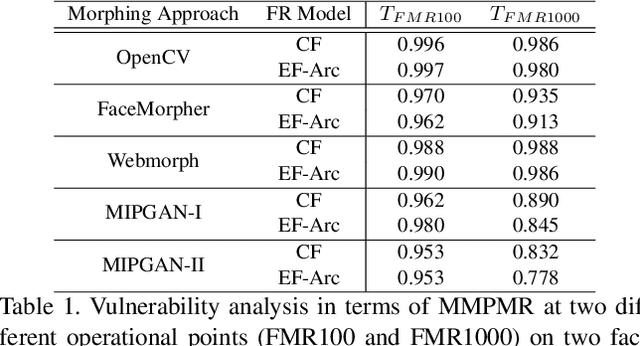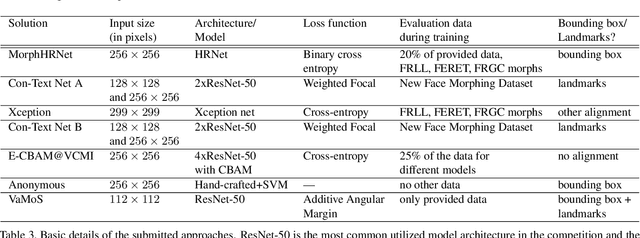Borut Batagelj
Second Competition on Presentation Attack Detection on ID Card
Jul 27, 2025Abstract:This work summarises and reports the results of the second Presentation Attack Detection competition on ID cards. This new version includes new elements compared to the previous one. (1) An automatic evaluation platform was enabled for automatic benchmarking; (2) Two tracks were proposed in order to evaluate algorithms and datasets, respectively; and (3) A new ID card dataset was shared with Track 1 teams to serve as the baseline dataset for the training and optimisation. The Hochschule Darmstadt, Fraunhofer-IGD, and Facephi company jointly organised this challenge. 20 teams were registered, and 74 submitted models were evaluated. For Track 1, the "Dragons" team reached first place with an Average Ranking and Equal Error rate (EER) of AV-Rank of 40.48% and 11.44% EER, respectively. For the more challenging approach in Track 2, the "Incode" team reached the best results with an AV-Rank of 14.76% and 6.36% EER, improving on the results of the first edition of 74.30% and 21.87% EER, respectively. These results suggest that PAD on ID cards is improving, but it is still a challenging problem related to the number of images, especially of bona fide images.
First Competition on Presentation Attack Detection on ID Card
Aug 31, 2024



Abstract:This paper summarises the Competition on Presentation Attack Detection on ID Cards (PAD-IDCard) held at the 2024 International Joint Conference on Biometrics (IJCB2024). The competition attracted a total of ten registered teams, both from academia and industry. In the end, the participating teams submitted five valid submissions, with eight models to be evaluated by the organisers. The competition presented an independent assessment of current state-of-the-art algorithms. Today, no independent evaluation on cross-dataset is available; therefore, this work determined the state-of-the-art on ID cards. To reach this goal, a sequestered test set and baseline algorithms were used to evaluate and compare all the proposals. The sequestered test dataset contains ID cards from four different countries. In summary, a team that chose to be "Anonymous" reached the best average ranking results of 74.80%, followed very closely by the "IDVC" team with 77.65%.
Beyond Detection: Visual Realism Assessment of Deepfakes
Jun 09, 2023Abstract:In the era of rapid digitalization and artificial intelligence advancements, the development of DeepFake technology has posed significant security and privacy concerns. This paper presents an effective measure to assess the visual realism of DeepFake videos. We utilize an ensemble of two Convolutional Neural Network (CNN) models: Eva and ConvNext. These models have been trained on the DeepFake Game Competition (DFGC) 2022 dataset and aim to predict Mean Opinion Scores (MOS) from DeepFake videos based on features extracted from sequences of frames. Our method secured the third place in the recent DFGC on Visual Realism Assessment held in conjunction with the 2023 International Joint Conference on Biometrics (IJCB 2023). We provide an over\-view of the models, data preprocessing, and training procedures. We also report the performance of our models against the competition's baseline model and discuss the implications of our findings.
SYN-MAD 2022: Competition on Face Morphing Attack Detection Based on Privacy-aware Synthetic Training Data
Aug 15, 2022



Abstract:This paper presents a summary of the Competition on Face Morphing Attack Detection Based on Privacy-aware Synthetic Training Data (SYN-MAD) held at the 2022 International Joint Conference on Biometrics (IJCB 2022). The competition attracted a total of 12 participating teams, both from academia and industry and present in 11 different countries. In the end, seven valid submissions were submitted by the participating teams and evaluated by the organizers. The competition was held to present and attract solutions that deal with detecting face morphing attacks while protecting people's privacy for ethical and legal reasons. To ensure this, the training data was limited to synthetic data provided by the organizers. The submitted solutions presented innovations that led to outperforming the considered baseline in many experimental settings. The evaluation benchmark is now available at: https://github.com/marcohuber/SYN-MAD-2022.
Face Morphing Attack Detection Using Privacy-Aware Training Data
Jul 02, 2022



Abstract:Images of morphed faces pose a serious threat to face recognition--based security systems, as they can be used to illegally verify the identity of multiple people with a single morphed image. Modern detection algorithms learn to identify such morphing attacks using authentic images of real individuals. This approach raises various privacy concerns and limits the amount of publicly available training data. In this paper, we explore the efficacy of detection algorithms that are trained only on faces of non--existing people and their respective morphs. To this end, two dedicated algorithms are trained with synthetic data and then evaluated on three real-world datasets, i.e.: FRLL-Morphs, FERET-Morphs and FRGC-Morphs. Our results show that synthetic facial images can be successfully employed for the training process of the detection algorithms and generalize well to real-world scenarios.
 Add to Chrome
Add to Chrome Add to Firefox
Add to Firefox Add to Edge
Add to Edge